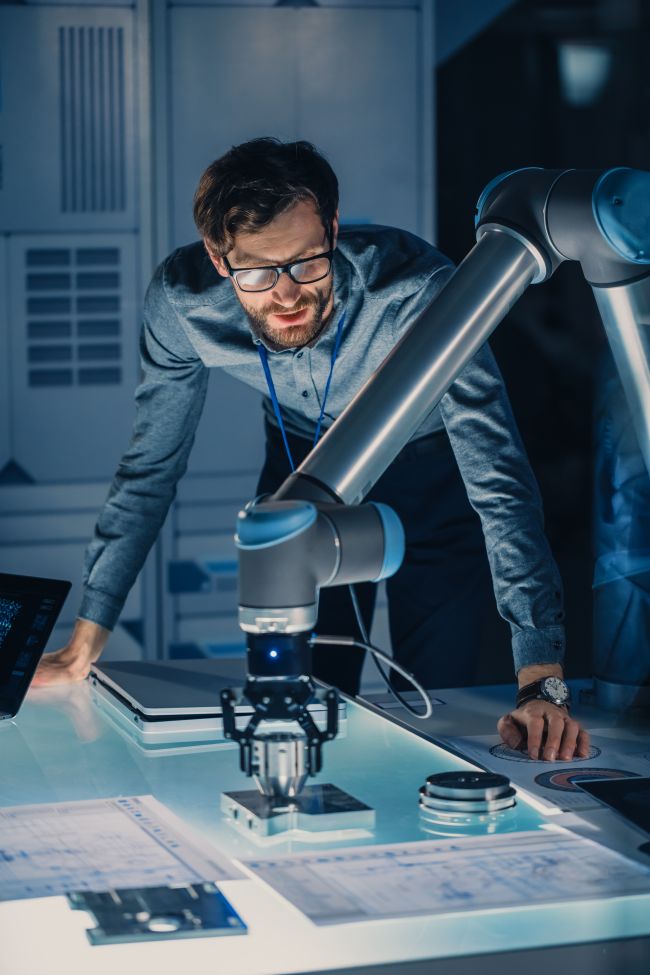Precision Automation Conferences
Explore the possibilities in R&D for high-precision machines and industrial robotics between Germany and Taiwan.
Join the conversation and establish new contacts across ecosystems.

Conference 1: Hardware upgrades
Moving beyond boundaries of robotics and high-precision machining.
German industrial robot manufacturers can collaborate with Taiwanese high-precision machine manufacturers to develop specialized robotic systems tailored for the requirements of high-precision machining.
By leveraging Taiwanese expertise in precision engineering and machine tool manufacturing, German companies can design robots that are optimized for integration with high-precision machines, ensuring seamless compatibility and performance. At the same time, manufacturers of high-precision machines can further develop interoperability of their technologies with industrial robots or add new robotics-enabled capabilities to their products.
Key topical highlights:
- Robotics enabled adaptive high-precision machining: Industrial robots can be equipped with advanced sensing and control systems to enable adaptive, automated machining in high precision machine tools. By monitoring and compensating for variations in workpiece dimensions or material properties, robots can adjust machining parameters in real-time. This adaptive approach ensures consistent quality and precision, even in the presence of slight variations.
- Sensor technology for robotic in-process inspection in high-precision machines: Robots equipped with sensors and vision systems can accurately measure critical dimensions, check for defects, and perform quality control checks during the machining process. This real-time feedback enables immediate adjustments and ensures that the final products meet the required specifications.
- Robotic loading systems for high-precision machines: Industrial robots can be used to automate the loading and unloading of workpieces in high precision machine tools. Robots can handle heavy or delicate components with precision, reducing the risk of damage and increasing overall productivity. By eliminating the need for manual intervention, robotic loading and unloading systems can also enhance worker safety.
- Robotic tool changing for high-precision machines: Industrial robots can facilitate automatic tool changing and management in high precision machine tools. By integrating robotic systems with tool storage and retrieval systems, tools can be automatically selected, changed, and calibrated as needed during the machining process. This reduces downtime and enables the use of multiple tools or tool configurations, enhancing flexibility and efficiency.
- Enhanced Accuracy and Precision for Industrial Robots: Taiwanese high-precision machine tools are known for their exceptional accuracy and precision. Taiwanese high-precision machine tools are renowned for their quality and reliability. A collaborative R&D effort could lead to innovations in precision robotics, which is critical for German industries such as automotive, electronics, and healthcare that require high precision in manufacturing.
The combination of precise machine tools and advanced robotics can enable complex tasks such as micromachining, intricate part assembly, and delicate material handling with exceptional precision.
By fostering the mutual synergies, German and Taiwanese manufacturers are best set to paving the way for a future where high-precision machining and robotics work, ensuring a global impact on manufacturing excellence.
Event details:
Precision Automation:
Integrating Industrial Robotics with High-Precision Machining
Part 1: Hardware upgrades
Date & Time:
Date TBA (within H1/2025), 10:00-11:30 CET
Online:
MS Teams
Participants:
10 mature companies from Germany and Taiwan with at least 4:6 national parity.
Ticket pricing:
On request.
Conference 2: System Integration
Creating adaptable manufacturing solutions that support customized, on-demand production.
The collaboration between the industrial robotics and precision machinery sectors aims to integrate Taiwanese modular machine tools with German robotic systems.
This partnership focuses on creating adaptable manufacturing solutions for customized, on-demand production, leveraging advanced control systems for enhanced productivity, quality, and efficiency in automated robotic workcells.
Key topical highlights:
- Seamless Integration: Combining high-precision machine tools with industrial robots within automated workcells streamlines the manufacturing process. This approach optimizes workflow, reduces material handling times, and significantly improves efficiency through effective loading, unloading, and transportation of workpieces across various machining stations.
- Cross-Connectivity and Data Analysis: Enhanced process control and comprehensive data analysis are facilitated through this integration. By generating detailed data on machining parameters, cycle times, tool wear, and process performance, and utilizing advanced sensors, IoT capabilities, data analytics, and machine learning, the initiative aims to refine machining processes, extend tool life, and boost overall equipment effectiveness (OEE).
This collaborative effort promises to advance manufacturing precision and productivity by merging the strengths of both sectors. Through optimizing workflow and embracing cutting-edge technologies for data analysis, this partnership is set to redefine the standards of efficiency and customization in the manufacturing industry.
Event details:
Precision Automation:
Integrating Industrial Robotics with High-Precision Machining
Part 2: System Integration
Date & Time:
Date TBA (within H1/2025), 10:00-11:30 CET
Online:
MS Teams
Participants:
10 mature companies from Germany and Taiwan with at least 4:6 national parity.
Ticket Pricing:
On request.
Get in touch to learn more
- Participate in innovative R&D networking format tailored for SMEs
- Limited pilot offer, First-come-first-serve
- Pay after the event